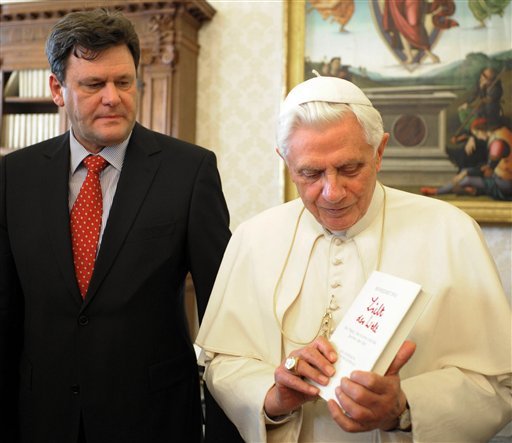Pope Benedict attacks the decadence of the Church in Germany
At 8 pm, the Swiss Guards closed the gates of the Pope's summer palace in Castel Gandolfo. Then they left their posts. So they demonstrated on 28 February 2013 that Benedict XVI was now Supreme Pontiff emeritus, a Pope retired. Benedict retired to a convent in the Vatican and vowed to continue to live like a monk and leave the field to the successor.
Benedict however cracks open the doors again this Friday. It is then a book of conversations that the journalist Peter Seewald has had with the Pope appears in Germany and many other countries. The result was a mixture of autobiography, last testament and written defence. Therein Joseph Ratzinger tries to explain himself and his pontificate to the world.
The fine balance awaits for each of his words
Now the resignation of a pope is a tricky thing, because the old pontiff could contradict the new one. The history is rich with antipopes and schisms. According Benedict has lived in a reserve style since that February evening. If he talks about the strengths and weaknesses of his pontificate, cliques, religious doubts and his successor Francis, it is a delicate matter. The fine balance awaits for each of his words.
Here, the book is easy in style and anecdotes. The reader learns that the young theology professor Ratzinger often played "Ludo”, was blackened as a heretic and like "carousing" during the Second Vatican Council in Trastevere. Other passages are significant. He tells how much his election as Pope burdened him. However, he did know precisely, as a former prefect of the CDF, the dark side of the Church. Paedophile priests, opaque finances and corruption were the "dirt" in the church which he wanted to eliminate. But they were persistent. "Of course I wanted to do more than I could." After all, he had sacked hundreds paedophile priests and smashed a homosexual old boy network in the Vatican. "Whether that has formed again, I do not know."
He underestimated the political significance of his Regensburg speech
Benedict openly acknowledges that he underestimated the political significance of his Regensburg speech. It was released worldwide in 2006 to violent protest from Muslims. In contrast, he blames staff for the affair of Holocaust denier Bishop Williamson, whose excommunication Benedict lifted in 2009. They gave him bad advice. Thereafter, a "huge propaganda campaign was unleashed against me".
The former Archbishop of Munich sharply judges the Catholic Church in Germany to the Court. He complains about "a well-established and highly paid Catholicism" along with "over dependence on unholy bureaucracy", a "theorization of faith" and a "lack of a living dynamism." Benedict sounds rather more gentle when he talks about Francis. His choice completely surprised him and initially unsettled him. But then the cordial dealings of his successor with people have made him happy. Francis emphasises different things, but there are no contradictions. Do you have to believe it? More clarification is probably not to be expected from Benedict. The title of the book is: "Recent Conversations".
Source










.jpeg)

Comments